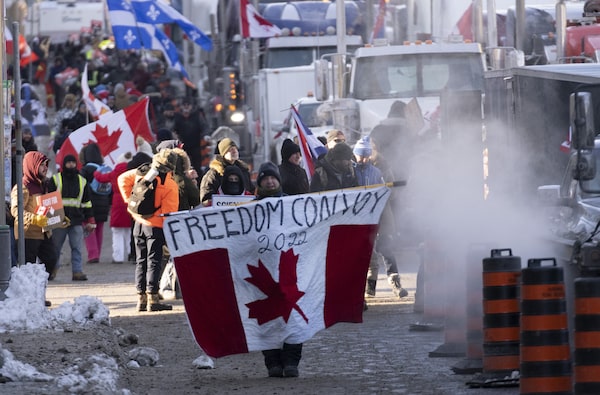
Protesters walk near Parliament Hill in Ottawa, Saturday, Jan. 29, 2022.Adrian Wyld/The Canadian Press
A week before the Emergencies Act was invoked, Canada’s intelligence agency told senior government officials it had found no evidence of foreign actors or states financing the convoy protests.
Minutes of a meeting held on Feb. 6 with top-ranking officials from municipal, provincial and federal governments were tabled Tuesday at the Public Order Emergency Commission, led by Justice Paul Rouleau.
“There [are] no foreign actors identified at this point supporting or financing this convoy. FINTRAC is supporting this work/assessment and the banks are also engaged,” CSIS director David Vigneault said, according to the minutes.
Less than a week later though Prime Minister Justin Trudeau said there was significant foreign funding and leaked donor data from one American crowdfunding site GiveSendGo showed about 40 per cent of donations to the convoy originated in the U.S.
Mr. Vigneault, Jody Thomas – the Prime Minister’s national security and intelligence adviser – and RCMP Commissioner Brenda Lucki were on the call with then Ottawa police chief Peter Sloly and city manager Steve Kanellakos. Federal deputy minister for public safety Rob Stewart was also on the call, as was Ontario’s deputy solicitor-general, Mario Di Tommaso.
Mr. Vigneault said Canada’s anti-money laundering watchdog, FINTRAC, and banks were tracking the GoFundMe donations supporting the protests, as well as other fundraising platforms, to ensure the money was not being “used for a non-peaceful purpose.”
“There is not a lot of energy and support from the U.S.A. to Canada,” he said. “CSIS has also not seen any foreign money coming from other states to support this.”
He also told officials on the call that there were “hardened elements” in the protest “who will likely use violence.” He said they were involved in the protests on Parliament Hill and in Quebec City, Toronto and Alberta.
“However, they are not actively participating or organizing it and are likely using this as a recruiting ground.”
Trudeau accused Ontario Premier Doug Ford of ‘hiding’ during convoy protests, new documents show
The call took place at the end of the second weekend of disruptive demonstrations in Ottawa to protest the government’s vaccine mandates and, more generally, the government itself. The protests took over Ottawa’s downtown, upending daily life for residents and forcing businesses in the area to close.
On the other side of the country, a border blockade was under way in Coutts, Alta. And the day after government officials were briefed by CSIS, protesters blocked Canada’s most important trade route, in Windsor, Ont.
At the end of that week, on Feb. 11, Prime Minister Justin Trudeau told reporters at a news conference that foreign actors had become a concern. He said U.S. citizens were participating in the blockades and there were signs of “foreign money to fund this illegal activity.”
He did not specify which of the three main protests in Canada involved foreign influence and money.
Asked by The Globe and Mail at the time to clarify the percentage of funds coming from the U.S., Mr. Trudeau said, “I’ve heard that on certain platforms, the number of U.S. donations are approaching 50 per cent.”
Over the subsequent weekend the U.S.-based Christian fundraising website GiveSendGo was hacked and the leaked data revealed tens of thousands of Canadian and American donors had collectively contributed millions of dollars to the demonstrations.
On Feb. 14, the federal government invoked the Emergencies Act to bring the demonstrations to an end.
On Wednesday The Globe asked the Prime Minister’s Office whether CSIS changed its advice and said there was foreign funding for the protests. Mr. Trudeau’s office did not directly answer but noted that the government learned about the foreign source of funds as the protests progressed.
The meeting minutes for Feb. 6 were presented Tuesday at the commission studying the use of the act, but so far witnesses have not been asked about the CSIS intelligence.
The Public Order Emergency Commission is tasked with determining whether the federal government met the required legal threshold to avail itself of the Emergencies Act’s extraordinary temporary powers. The government used those powers to crack down on protesters, even allowing banks to freeze their accounts without court orders.